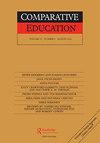结论性思考:幼儿教育比较研究的现状与未来方向
IF 3.7
1区 教育学
Q1 EDUCATION & EDUCATIONAL RESEARCH
引用次数: 2
摘要
在本文中,我们考虑了幼儿教育(ECE)比较研究的现状,并提出了未来方向的建议,特别是对“解决方案科学”日益占主导地位的质疑,并提出了追求“差异科学”的好处和影响(Nóvoa[2018])。“比较南欧:差异、公共和共同”。比较教育54(4):548-561。通过采用“批判”的视角并结合Nóvoa的概念,我们借鉴本期特刊中包含的论文,讨论目的、范式、地位和权力等问题,以及它们对欧洲经委会比较研究的意义。我们认为,尊重和重视多样性阻碍了解决主义的技术官僚比较教育方法。这篇文章描绘了从过去到现在的方向,并将它们与欧洲经委会比较教育的未来联系起来,作为一门多元化的、伦理的和民主的“科学”。本文章由计算机程序翻译,如有差异,请以英文原文为准。
Concluding reflections: current issues and future directions for comparative studies in early childhood education
ABSTRACT In this article, we consider the current state of comparative studies in Early Childhood Education (ECE) and set out proposals for future directions, in particular contesting the increasing dominance of a ‘science of solutions’ and proposing the benefits and implications of pursuing a ‘science of difference’ (Nóvoa [2018]. “Comparing Southern Europe: The Difference, the Public, and the Common.” Comparative Education 54 (4): 548–561). By adopting a ‘critical’ perspective and working with Nóvoa’s concepts, we draw on the papers included in this special issue, to debate issues of purpose, paradigm, position, and power, alongside their significance for the comparative study of ECE. We argue that respecting and valuing diversity discourages solutionist technocratic comparative education approaches. The article maps directions from the past to the present and connects them with the future of comparative education in ECE as a diversity engaged, ethical and democratic ‘science’.
求助全文
通过发布文献求助,成功后即可免费获取论文全文。
去求助
来源期刊

Comparative Education
EDUCATION & EDUCATIONAL RESEARCH-
CiteScore
7.40
自引率
21.20%
发文量
35
期刊介绍:
This international journal of educational studies presents up-to-date information with analyses of significant problems and trends throughout the world. Comparative Education engages with challenging theoretical and methodological issues - and also considers the implications of comparative studies for the formation and implementation of policies - not only in education but in social, national and international development. Thus it welcomes contributions from associated disciplines in the fields of government, management, sociology - and indeed technology and communications - as these affect educational research and policy decisions.
 求助内容:
求助内容: 应助结果提醒方式:
应助结果提醒方式:


